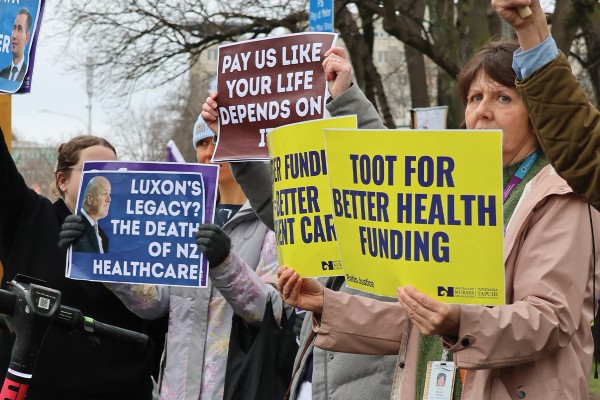Last Wednesday, Dunedin nurses joined a national 24-hour strike to protest dangerously low staffing in hospitals across the motu. Marching from the Octagon, a large crowd had gathered on the Museum Reserve by noon, expressing their dissatisfaction with the current Government and Te Whatu Ora’s responses to widespread staffing shortages. Their efforts were met with an outpour of support from students, trade unions, and honking cars.
Jenny Parker, an enrolled nurse working in the Puāwai Rehabilitation Unit at Wakari Hospital was one of many striking nurses. She described how low staffing numbers mean that when a nurse is sick, sometimes there are simply no replacements. Nurses will often pull dangerous hours, working consistent strings of 12 hour shifts with no reprieve. It’s unsafe for both nurses and patients. “I get home and I’m exhausted, absolutely exhausted. And I have a shift the next day at seven in the morning,” Parker told Critic.
Working with post-stroke patients and patients with traumatic brain injuries, Parker said that they will sometimes have to make do with only two nurses for around twelve patients, leading to increased wait-times and an overall lesser ability to provide proper care. “It can be quite detrimental to patients’ health and wellbeing,” she said.
Parker noted the importance of newly graduated students to the sector, given their tendency to bring in new ideas. “Something may not work for a nurse that has been nursing for twenty years, [but] it might work for a new grad who has new ideas and different skills.” Despite this sentiment, RNZ reported that only three fifths of midyear nursing graduates found employment by Te Whatu Ora in nursing.
Compounding this is the temptation for our fledgling healthcare providers to jump the ditch for better pay in Aussie. One Med student at the protest expressed sympathy for nursing graduates, who he said are often blamed for going overseas to find work when “that’s the only option for them.” He explained, “They’re advertising roles in Australia for New Zealand graduates and they say ‘we pay higher than New Zealand rates and we can provide you with housing support as well’. Why can’t our government do that here [...] support a wage that says we care about you and we want you to stay in New Zealand?”
At the rally supporting the nurses were several union representatives, including Unite, E Tū, NZEI Te Riu Roa, Rail and Maritime Transport, Tramways, the Public Service Association, and the Tertiary Education Union. All unions unanimously spoke on the importance of solidarity in the face of inequitable pay. Brandon Johnstone, a member of the Tertiary Education Union and an Otago University staff member, spoke of the squeeze on nurses to be just one part of the current Government’s attacks on public services. Johnstone claimed that the current Government was “strangling public spending so that they can pay for tax cuts for rich landlords instead of for nurses.”
Speakers also highlighted the importance of solidarity with nurses. “We’re all fucking connected,” a representative from the Rail and Maritime Transport Union urged. “Let's be honest: a boat injury or a railway injury is not going to be solved with a bandaid, it’s going to be serious. When nurses are under attack, stand up, fight back!”
At the time of writing, Health Minister Simeon Brown’s response to the strike was criticising the “real and avoidable harm” to patients that the strike had caused, with an estimated 4300 planned procedures and specialist appointments having to be postponed as a result, according to 1News. The NZ Council of Trade Unions has said, “Workers never make the decision lightly. It is only when they have exhausted all other options."







